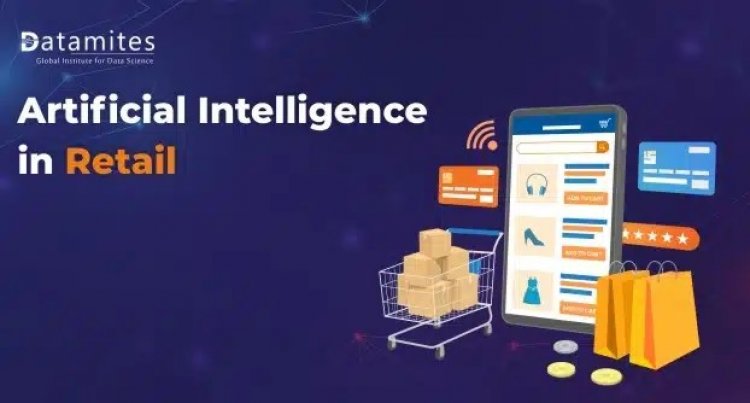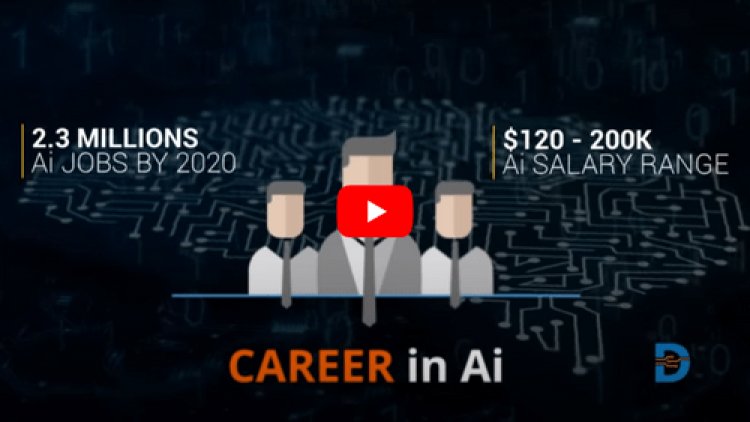AI in Retail – Ways AI is Revolutionizing the Shopping Experience

Isn’t it well known that artificial intelligence can make the current dynamic world seamless to navigate? And the retail industry is no exception to that. The most effective tactic in the retail sector is linking data from the physical store experience to the online experience!
Is AI taking over the Retail Industry?
Recently, AI has been used to address issues that affect all businesses. Still, specifically, it enabled the IT sector to innovate in response to our changing interactions and purchase patterns, which have radically shifted towards adopting digital technology. AI can be used to make this new dynamic world easier to govern. Guess how?
From the physical retail interface to the cloud, the industry has garnered AI to its fullest potential. The most potent tool in the retail industry’s arsenal is the data-driven integration of physical store experience insights with online experience, despite the majority of use cases in the sector being on commerce retail. Retailers must now respond to their customers in a way that has never been done before, reducing waste and inefficiencies in business operations at the same time. Indeed, the capabilities of AI are impressive!
It’s well known that so much data is available at the moment, but taking the right approach to this overwhelming amount of data requires real expertise. For retailers, this results in amazing customer experiences, chances to increase revenue, and quick innovation to set them up for success!
The pandemic made it imperative for the digital footprint of the retail sector clear. Up to 2027, the market for AI in retail would expand at a 35% CAGR according to Market Study Report. Market size is projected to increase to 14.71 billion USD in 2027 from 1.80 billion USD in 2020. Businesses that target the online market also look for ways to gain an edge over rivals. We won’t persuade you to believe in magic, only in potent AI algorithms.
Refer to the article: Support Vector Machine Algorithm (SVM) – Understanding Kernel Trick
- Seamless and Personalized Customer Interactions
Retailers strive to produce shopping experiences that are practical, unique, and enjoyable at the same time. Indeed, customers should be happy about the experience that they had while shopping to make them want to come back again. They should be able to swiftly find what they are looking for, get assistance when necessary, and be able to complete the checkout process efficiently.
Artificial intelligence helps simplify all that we mentioned above, which contributes to more positive client experiences. Computer vision enables retailers to track customer activity and present the audience with relevant real-time advertising.
- Forecasting Demand and Retailing
A better understanding of consumer patterns and behaviors is essential to match up with their demands and offer the finest products. AI supports the merchant’s decision-making for pricing, product placements, and better demand forecasting. Customers are therefore able to get hands-on with what they essentially need at the right time and place.
With AI, retailers can more readily foresee future client and market expectations, which will help them better address the needs of their customers. AI could help assist analyze customer behavior patterns from the past and help forecast that in the future.
- Streamlining Store Operations
With the advent of AI, there is no longer any doubt that automating processes is one of the most meaningful respects that AI is shaping the retail industry. Heretofore, automation processes were carried out by human labor. By tying together more areas of their business and adopting AI, retailers may acquire a thorough understanding of their stores, clients, and products to help with inventory management.
There are many benefits to this, including the ability for personnel to focus more of their time on solving complicated customer-related problems and less time on menial chores. The customer’s overall experience can be improved by doing this right off the bat, which will increase sales and, of obviously, profit!
- Monitor Customer Behaviour
Your store may also benefit from mood tracking, which can be accomplished with cameras strategically positioned throughout. Unlike AI algorithms, store employees are unable to watch every customer. A customer who is irate is alerted by one of your staff members, who can then go talk to them right away. More quickly than using traditional approaches, this innovation increases customer happiness and grows your fan base.
- Boosting Retail Supply
Supply chain optimization is possible through artificial intelligence technology. AI can analyze the purchasing patterns of clients and notify retailers prior to their products running out of stock. This is integral to any business because if the clients are unable to find the required product they are most likely to go for others to get their hands on it. This could lead to sales loss, which will ultimately hurt the bottom line of retailers.
AI can also forecast when customers will be more likely to desire particular products, enabling retailers to start stocking up early rather than rushing to have these popular seasonal items secured.
- Greater Customer Satisfaction
By making it easier for companies to keep customers, AI is transforming the retail industry. Chatbots, which are effective AI systems, may help customers find their way around stores and even provide highly customized product recommendations. When it comes to making recommendations that complement the other items that clients have previously put on their shopping lists, these chatbots are the knights in shining armor.
By suggesting comparable products when users upload images of the goods they want to buy, artificial intelligence in retail can help make the shopping process more convenient for customers. These simple but powerful techniques provide results right away, improve customer satisfaction, and keep customers coming back for future purchases.
Read this article: AI in Finance – How AI is refining the Finance and Banking Sector?
- Mitigating Loss
Artificial intelligence has made great progress to play a vital role in protecting shops from any form of loss. AI is designed to spot any strange transactions and even alert merchants about potential shoplifting in real time. AI solutions are also reliable in many respects because they protect the retailer’s well-being without compromising customer privacy. This is accomplished through appropriate authentication procedures that separate authorized users from those who may have logged into the systems with malevolent intent.
- Price Control
Retailers may now set prices for their items more aggressively to compete in the market thanks to AI technology. AI can instantly read information about a product’s actual cost, promotional activities, and market sales numbers and maintains its par for making profits within the same threshold while operating more effectively.
One of these advantages of artificial intelligence is price forecasting. According to demand, seasonal trends, characteristics, consumer preferences, the release date of new models of the same items, etc., AI analyses and interprets the statistics. AI has opened up new possibilities for enterprises, giving them a competitive advantage over their rivals.
- Online Trailrooms
AI technology received a significant boost from a new fashion and shopping trend, particularly around the period of the pandemic. Customers who use these virtual fitting rooms are able to locate the ideal outfits with all of the elements exactly matched quickly and conveniently from the comfort of their own homes.
They function by using the representation of customers in the stores to choose the clothing that has to be tried on, giving one a realistic impression of the outfit without even physically trying it on. This brings convenience and efficiency to the home!
- Product classification and stock control
Machine learning algorithms and AI-based technologies can assist retailers to regulate and maintain a check on product classification so that customers can be directed to the appropriate area of the store rather than having to sift through a large number of useless items.
This can also work with regard to having an image of the product in-store to be able to get an idea and the location of the same product with its details, price, and even size availability. This would not only help in saving time but it would also help in getting the real-time inventory to the store to bring in the required stocks each day to help with the store’s financial needs.
- Comments and Prediction
After the sale and payment are complete, the electronic gadgets that have been installed are likely to inquire about the consumer experience. Nowadays, all client information is recorded in order to inform them of impending offers and specials, making it simpler for retailers to solicit feedback, determine their consumer happiness using Artificial Intelligence tools, and identify areas for development.
This assists in understanding the customer’s predictions based on past purchases, preferences, and sizes and keeps them informed of the most recent items offered on their specific products, as well as store and location-specifically. This will not only give customers a customized experience, but it will also ensure that the entire user experience is streamlined and efficacious.
Also refer to the article: Taking a Look at the Role of AI in Education
AI in Retail – The Future
Every facet of retail business can be changed by AI. It replaces intuition with intelligence and provides retailers with a future-focused perspective. In the era of AI and big data, businesses will profit from the effectiveness of AI by improving their intelligence to provide happier customers, better services, better responses to client wants, and supplies to maintain their competitiveness. Given the once-established traditional sector’s long history, the role AI has played in the retail industry’s transformation is all the more astounding. Retailers today depend more and more on electronic platforms to find profitable sales.
When integrating AI, business executives need to take a practical approach. They must be aware that the technology requires a significant initial investment and only yields long-term benefits. To succeed, a corporation must establish a long-term AI goal. Start with little endeavors and then link them with long-term AI skill sets to move forward successfully.
Artificial Intelligence Course Introduction
Final Say
Whether it’s eBay‘s smart search feature, improved recommendation systems, Sephora‘s shade finder, or Amazon‘s Just Walk Out Technology, AI is applied at almost every stage of the retail process for a more pleasant and efficient shopping experience. AI is admittedly having a big impact on businesses all around the world, just as it is starting to play a pivotal role in retail.
If you’re interested in learning more about what a career in artificial intelligence entails, consider taking one of the DataMites Artificial Intelligence Courses. Our Artificial Intelligence Courses are carefully crafted to instill vital skills in potential candidates to take over the field. In addition to artificial intelligence, we also provide training in data science, python, machine learning, data analytics, and more!
Artificial Intelligence Training


